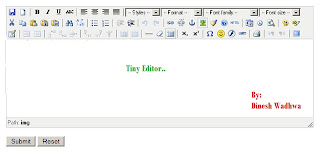Delete data from Gridview using Command Field
In this article, I am going to explain how to delete a record from Gridview.This is very easy process and steps for this is as follows: 1. Add New Webpage in your Webapplication. 2. Drag Gridview from toolbox and bind it to database. Note :If you need any help in binding the gridview to the database you can view my article which is: http://dinesh-itsolutions.blogspot.com/2010/09/dynamic-gridview-bind.html 3. Now we proceed further after successfully binding of data.The Steps for Deleting records from gridview are: a: Select Edit columns from properties of Gridview. b:You will see dialog box appears for Field: c:You have to select the Command Fields option from the available field.In Command Fields you will find 3 events which are: Edit,Update and Cancel. Select Delete From the above Points select Delete Button. d: Now fire the event RowDeleteing from Gridview Properties Coding to delete the data from gridview on Event Row Deleting ...

